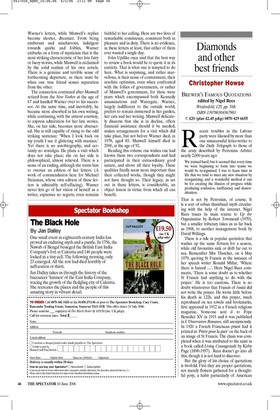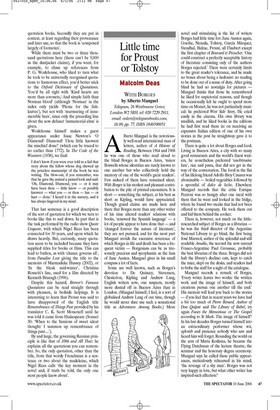Diamonds and other best friends
Christopher Howse
BREWER’S FAMOUS QUOTATIONS edited by Nigel Rees Weidenfeld, £25, pp. 568, ISBN 139780304367993 ✆ £20 (plus £2.45 p&p) 0870 429 6655 Recent troubles in the Labour party were likened by more than one unsuccessful letter-writer to the Daily Telegraph to those of the army described by Petronius Arbiter nearly 2,000 years ago:
We trained hard; but it seemed that every time we were beginning to form into teams we would be reorganised. I was to learn later in life that we tend to meet any new situation by reorganising; and a wonderful method it can be for creating the illusion of progress while producing confusion, inefficiency and demoralisation.
That is not by Petronius, of course. It is a sort of urban thumbnail myth circulating with the help of the internet. Nigel Rees traces its main source to Up the Organisation by Robert Townsend (1970), but a smaller tributary takes us as far back as 1968, to another management book by David Willings.
There is a tide in popular quotation that washes up the same flotsam for a season, while old favourites sink or drift far out to sea. Remember Mrs Thatcher, on 4 May 1979, quoting St Francis at the instance of her speech writer Ronald Millar, ‘Where there is hatred ...’. Here Nigel Rees comments, ‘There is some doubt as to whether St Francis had anything to do with the prayer.’ He is too cautious. There is no doubt whatsoever that Francis of Assisi did not write the prayer. He wrote little before his death in 1226, and this prayer, much reproduced on tea towels and bookmarks, first appeared in 1912 in a French religious magazine. Someone sent it to Pope Benedict XV in 1915 and it was published in L’Osservatore Romano, still anonymously. In 1920 a French Franciscan priest had it printed as ‘Prière pour la paix’ on the back of an image of St Francis. The chain was completed when it was attributed to the saint in a book called Living Courageously by Kirby Page (1890-1957). Rees doesn’t go into all this, though it is not hard to discover.
But the glory of his choice of quotations is twofold. First they are proper quotations, not merely flowers gathered for a thoughtful posy, a habit particularly of American quotation books. Secondly they are put in context, at least regarding their provenance and later use, so that the book is ‘composed largely of footnotes’.
While there must be two or three thousand quotations here (there can’t be 5,000 as the dustjacket claims), if you want, for example, to chase up references from P. G. Wodehouse, who liked to turn what he took to be universally recognised quotations to humorous effect, you’d better stick to the Oxford Dictionary of Quotations. You’d be all right with ‘Kind hearts are more than coronets,/ And simple faith than Norman blood’ (although ‘Norman’ in the index only yields ‘Phone for the fishknives’), but not with ‘murmuring of innumerable bees’, since only the preceding line about the now defunct ‘immemorial elms’ is given.
Wodehouse himself makes a guest appearance under Isaac Newton’s ‘O Diamond! Diamond! Thou little knowest the mischief done!’ (which can be traced to no earlier than 1772). In The Code of the Woosters (1938), we find:
I don’t know if you were ever told as a kid that story about the fellow whose dog chewed up the priceless manuscript of the book he was writing. The blow-out, if you remember, was that he gave the animal a pained look and said: ‘Oh, Diamond, Diamond, you — or it may have been thou — little know — or possibly knowest — what you — or thou — has — or hast — done.’ I heard it in the nursery, and it has always lingered in my mind.
That last sentence is a good description of the sort of quotation for which we turn to books like this to nail down. In part that is the task performed by the radio show Quote Unquote, with which Nigel Rees has been connected for 30 years, and upon which he draws heavily. But, curiously, many quotation seem to be included because they have supplied titles for books or films. This can lead to bathos, as with ‘chance governs all’, from Paradise Lost giving the title to the memoirs of Marmaduke Hussey (2002), or ‘In the bleak mid-winter’, Christina Rossetti’s line, used for a film directed by Kenneth Branagh (1996).
Despite this hazard, Brewer’s Famous Quotations can be read straight through with pleasure, in bedside helpings. It is interesting to learn that Proust was said to have disapproved of the English title Remembrance of Things Past provided by his translator C. K. Scott Moncrieff until he was told it came from Shakespeare (Sonnet 30: ‘When to the Sessions of sweet silent thought/ I summon up remembrance of things past...’).
By and large, the governing Reesian principle is like that of 1066 and All That: he explains all the quotations you can remember. So, the only quotation, other than the title, from that wordy Frenchman is a sentence or two about the madeleine, which Nigel Rees calls ‘the key moment in the novel and, if truth be told, the only one most people know about’.



















































































 Previous page
Previous page